 Your new post is loading...
 Your new post is loading...

|
Scooped by
Mel Riddile
October 3, 2015 1:21 PM
|
New data from the RAND Corp. tracks teachers' PD needs, with a focus on topics connected to the common core.

|
Scooped by
Mel Riddile
September 22, 2015 2:41 PM
|
Massachusetts Releases First Round Of PARCC Field Test Results. The Boston Globe (9/22, Fox) reports that Massachusetts education officials have released the results from the first year of PARCC testing in the state, noting that students “generally had lower scores” on the test. The piece quotes state Education Secretary James A. Peyser stressing that the results are preliminary, “This early report on PARCC results is preliminary and incomplete and therefore cannot yet be directly compared to this year’s MCAS results,” Secretary of Education James A. Peyser said in a statement. “I look forward to seeing the complete results as they become available.” The piece notes that the state BOE is scheduled to vote on whether to replace the MCAS with PARCC this November. The Springfield (MA) Republican (9/22) reports that MCAS scores rose this year, while “preliminary results from limited field tests of the PARCC exam were less likely to score in that test’s ‘meeting expectations’ category.” This piece also reports that Peyser “cautioned about ‘reading too much’ into the preliminary results.” The Daily Hampshire (MA) Gazette (9/22) also covers this story.

|
Rescooped by
Mel Riddile
from Common Core Online
September 17, 2015 7:23 PM
|
Updated "mock" score reports on its website now show the actual cutoff points that mark the thresholds between levels of mastery, said PARCC officials.
Via Darren Burris

|
Scooped by
Mel Riddile
September 9, 2015 8:11 PM
|
One teacher says she’s reading harder books with her students. A second is asking them to provide more evidence to support their answers. A third is now pushing students to find the solutions to math problems on their own. Last month, I spoke with eight actual teachers with actual classrooms...

|
Rescooped by
Mel Riddile
from Common Core Online
September 1, 2015 11:27 AM
|
Results for some of the states that participated in Common Core-aligned testing for the first time this spring are out, with overall scores higher than expected though still below what many parents may be accustomed to seeing.
Via Dr. Dea Conrad-Curry, Darren Burris

|
Rescooped by
Mel Riddile
from Common Core Online
August 27, 2015 12:55 PM
|
The following blog post is another in the Alliance’s “Core of the Matter” blog series focusing on the...
Via Darren Burris

|
Scooped by
Mel Riddile
August 26, 2015 3:16 PM
|
The latest results suggest that this year's graduating class may not be much more prepared than last year's class for college or a career.

|
Rescooped by
Mel Riddile
from Common Core Online
August 22, 2015 3:49 PM
|
A growing collection of mathematics lessons that illustrate the focus, coherence, and rigor of the Standards. These lessons can be adapted for instructional purposes.
Via Darren Burris

|
Scooped by
Mel Riddile
August 15, 2015 10:04 AM
|
The testing consortium approves cut scores for the high school test, but can't disclose yet what they are, since the point system--and spring performance data--are still being finalized.
"The threshold scores for each high school performance level were recommended by panels of teachers who were nominated by their states and convened in Denver last month. They examined test questions, analyzed their difficulty and suggested cut points that would place students in the five performance levels, which describe how ready they are for college. The "mid range" recommendations of those teachers were the levels that were adopted by PARCC representatives today, Nellhaus said."

|
Scooped by
Mel Riddile
August 2, 2015 12:41 PM
|
"Neither university faculty nor employers believe that American public high schools are preparing students for the expectations they'll face in college and career. - In fact, compared to 2004, the assessment is even more dismal. More than a decade ago, for example, only 28 percent of college instructors stated that schools were doing an adequate job of readying students for what came next after high school. That count is down to 14 percent in 2015.
- Among employers, 49 percent in 2004 said that schools were adequately preparing students for what they would need for work; in 2015, the count was 29 percent.
- Part of the challenge, say students themselves, is that their high schools don't set academic expectations high enough. Fifty-four percent said that they were only "somewhat challenged"; 20 percent said it was "easy to slide by.""

|
Scooped by
Mel Riddile
July 31, 2015 9:33 AM
|
The Governor's Council on Common Core Review, chaired by Lt. Gov. Tim Griffin, arrives at a bold conclusion: The Department of Education needs to review Common Core.

|
Scooped by
Mel Riddile
July 27, 2015 4:03 PM
|
A new study found that in two-year colleges, only 4 percent of instructors found students "most generally able to do what is expected." The number was slightly higher in four-year schools: 12 percent. The rest reported that students had arrived to higher ed with at least some gaps in preparation.

|
Scooped by
Mel Riddile
July 24, 2015 12:47 PM
|
What's preventing U.S. states from investing in high quality instructional systems like the world's top performers? It could come down to dollars and cents.
|

|
Scooped by
Mel Riddile
September 26, 2015 1:30 PM
|
"The consulting group McRel did an analysis of Nebraska's previous state standards in 2013 and found that 417 of the 546 common-core math standards (or about 76 percent) were addressed by the Nebraska standards. Epler of the Nebraska education department said he anticipates that, at some point, his organization will do a crosswalk with the new standards, "mainly to support our teachers and schools as many resources (textbooks, etc.) are CCSS-based." As I've written before, common-core materials have already crept into all the states that have refused to adopt the standards—Nebraska included."

|
Rescooped by
Mel Riddile
from Common Core Online
September 17, 2015 7:24 PM
|
Test results aren't yet final, because they don't include all groups of students, or the results of tests taken with paper and pencil.
Via Darren Burris

|
Scooped by
Mel Riddile
September 14, 2015 4:29 PM
|
In this episode, we check up on the progress of common core implementation in the state of North Carolina.
Discuss: #commoncore #CCSS
Follow: @Eduflack @dgburris @DrJuneAtkinson @curriculumblog @bamradionetwork

|
Scooped by
Mel Riddile
September 7, 2015 2:45 PM
|
This past spring saw the rollout of new tests based on the Common Core standards. The reading and math tests replace traditional spring standardized tests. About 12 million students in 29 states and the District of Columbia took the tests developed by two groups — the Smarter Balanced Assessment Consortium and the Partnership for Assessment of Readiness for College and Careers (PARCC). According to Smarter Balanced, only a few states have released scores from the spring — Connecticut, Idaho, Washington, Oregon, Missouri, West Virginia, and Vermont. Most states have not been able to put out test scores before the start of classes. The delay was expected in the exam's first year, but it's still frustrating for some teachers and parents. Scores for the almost 5 million students who took the PARCC tests still have yet to be released. PAARC is still setting benchmarks for each performance level. The partnership says they're due for release this fall, and that the goal in future years of the tests is to release the results as close to the end of the school year as possible.

|
Scooped by
Mel Riddile
September 1, 2015 11:27 AM
|
By Michael Kirst
"New York, NY (August 24, 2015)—A Kaplan Test Prep survey finds that 85% of parents of college-bound students are still unaware that the SAT is changing, even after two years since the change was announced and less than seven months before the new SAT launches in March 2016.* When provided more details about the proposed changes to the SAT, the surveyed parents’ opinions about the new format were divided: 30% say they viewed the changes as something negative or think the exam will be harder; 30% view the changes as something positive; 20% are indifferent; and 15% still don’t know enough to form an opinion. However, views on specific changes reveal that a majority of parents believe the new SAT will be harder:
- Math: The current SAT focuses on computational skills and allows students to use a calculator during all sections. The new SAT will focus on advanced algebra, data analysis, and real-world problem solving and calculators will only be permitted for one of two math sections. Fifty-six (56%) percent of parents say these changes make the Math portion of the new SAT harder; 18% say it will become easier; and 26% say it makes no difference.
- Reading: The current SAT Reading section includes three 20-25 minute sections of sentence completions, and long- and short-passage reading questions. The new SAT Reading section will last 65 minutes and be made up of long passages followed by reading comprehension questions and will also test understanding of passages from U.S. and World Literature, History/Social Science and Science. Fifty-three (53%) percent of parents say the redesigned SAT Reading section will be harder than the current one; 12% say it will become easier; and 36% say it makes no difference.
- Writing and Language/Grammar: The current SAT tests grammar in the form of individual sentence correction. The new SAT will test grammar in the form of passages and will also include questions about structure and reading comprehension. Fifty-three (53%) percent of parents say the Writing and Language/Grammar portion of the new SAT will become harder; 13% say it becomes easier; and 34% say it makes no difference.
- Essay: The current SAT essay is required, and asks students to develop a persuasive essay about an issue; facts and grammar have little bearing on the overall score. The new SAT essay is optional, and asks students to read a 650-750 word passage and then prepare a facts-based essay analyzing how the author builds her/his argument. Sixty (60%) percent of parents say the SAT essay will become harder; 15% say the essay will become easier; and 25% say it makes no difference.
No Wrong Answer Penalty: The current SAT includes a ¼ point penalty for wrong answers. The new SAT eliminates the wrong answer point penalty. Fifty-six (56%) percent of parents say this change will make the new SAT easier; 22% say the change will make it harder; and 23% say it makes no difference"...
For full post, click on title above or here: http://collegepuzzle.stanford.edu/?p=4782#sthash.Xo0lEUZm.dpuf

|
Scooped by
Mel Riddile
August 26, 2015 3:23 PM
|
When George Washington University announced last month that it was adopting a “test-optional” admissions policy, it repeated a standard line made by colleges that allow prospective students to opt out of sending SAT or ACT scores. “The test-optional policy should strengthen and diversify an already outstanding applicant pool and will broaden access for those high-achieving …

|
Rescooped by
Mel Riddile
from Leading Schools
August 23, 2015 11:40 AM
|
Engage your students with high-quality informational text that allows them to explore their own interests. Natalie Franzi and Steve Figurelli share five fabulous websites.

|
Scooped by
Mel Riddile
August 17, 2015 9:04 AM
|
Prince George’s “Camp IB” and other summer efforts prepare students for rigorous academic challenges.

|
Rescooped by
Mel Riddile
from Common Core Online
August 5, 2015 3:18 PM
|

|
Scooped by
Mel Riddile
July 31, 2015 9:36 AM
|
Under fire from conservatives, changes are made to AP U.S. History framework. Facing Conservative Pressure, College Board Revises AP History Test. The Washington Post (7/31, Layton) reports that on Thursday the college board released “a new version” of its AP history course, noting that it has been “under fire during the past year from conservatives for revisions it made” to the course in 2014. The piece notes that conservatives “slammed the 2014 Advanced Placement history course saying it overemphasized negative aspects of US history.” The Atlanta Journal-Constitution (7/31) also covers this story.

|
Scooped by
Mel Riddile
July 29, 2015 5:38 PM
|
Education officials say PARCC saved $2.5M compared to previous state tests
State education officials say new standardized tests last year saved the state more than $2.5 million, compared to previous state assessments.

|
Scooped by
Mel Riddile
July 25, 2015 10:10 AM
|
Ultimate Maths helps you to discover mathematics. Learn and revise number, algebra, shape and data topics and access our large data bank of learning resources.
|
 Your new post is loading...
Your new post is loading...
 Your new post is loading...
Your new post is loading...




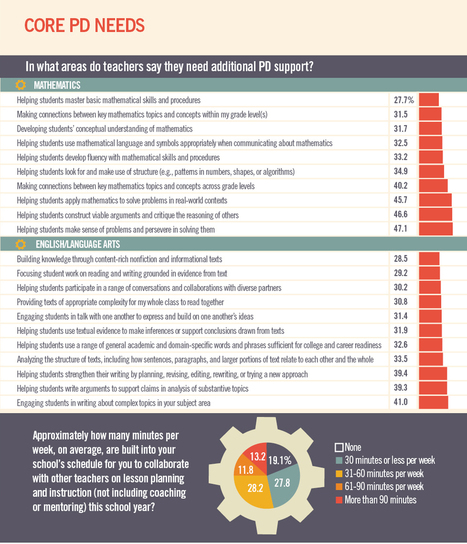

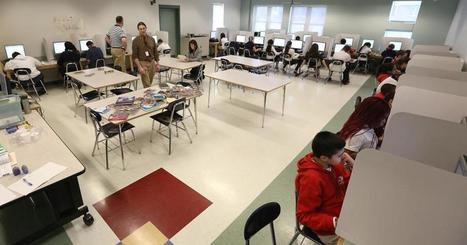



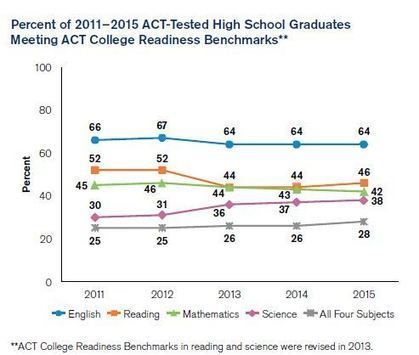


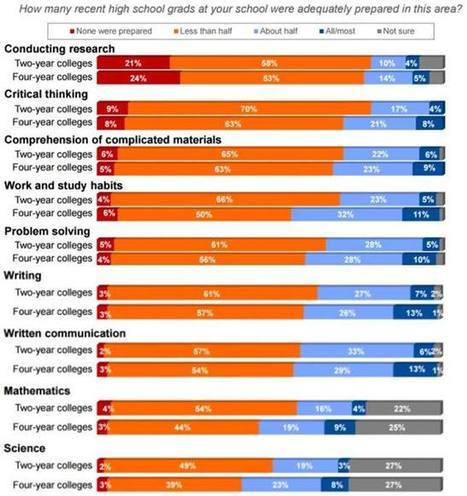

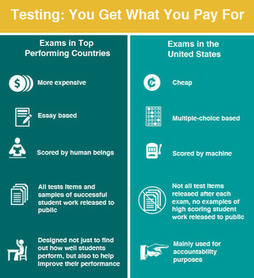
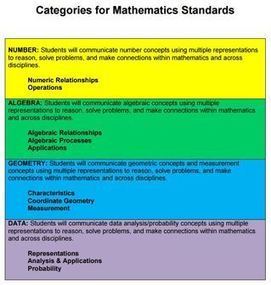






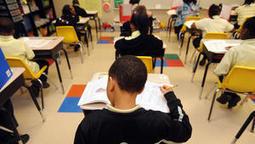






Interesting... very little time is provided for us to actually work towards continuous improvement. Evaluating student data to make adjustments in instruction is critical to the success of a school district. Time is always a barrier though...